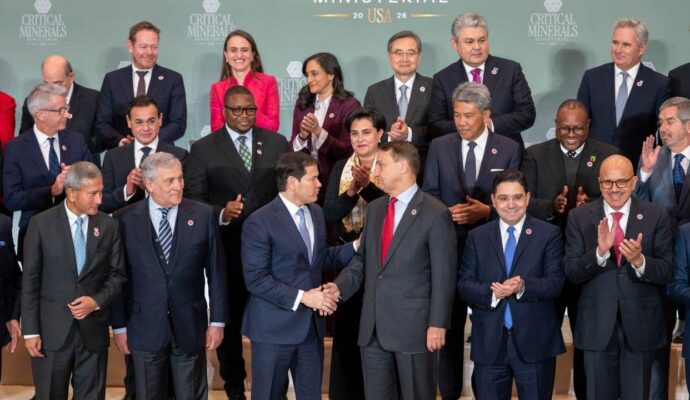Although the situations are not directly comparable – stationing spies and training troops in Cuba would not immediately threaten most countries in the region, unlike nuclear weapons – experts said this was a sign that Washington was losing ground for Latinos’ hearts and minds.
The reasons for the apparent apathy, they explain, are the growing importance of relations with China for most Latin American countries and the widespread perception that in the last 20 years, Washington has stopped caring about the region to concentrate its efforts first on the Middle East and now in the Indo-Pacific.
Meanwhile, Beijing has filled the void by expanding its diplomatic presence and investment, overtaking the United States as the largest trading partner in many of the region’s biggest economies.
China has signed free trade agreements with Chile, Costa Rica, Ecuador and Peru and is in advanced negotiations with Uruguay. In addition, 22 Latin American countries have already joined the Belt and Road Initiative – Chinese President Xi Jinping’s US$1.1 trillion infrastructure plan – and in 2021 Brazil became the main destination for Chinese investment in the world.
Leland Lazarus, a former US consul general in Shenyang, China, and now a China-Latin America scholar at Florida International University, said it was “disconcerting” to admit that the United States had taken for granted its historical influence over the region. The focus on the so-called war on terror in the early 2000s and the recent emphasis on relations with nations in Southeast Asia, he said, cost Washington “power and prestige”.
Lazarus said that while the foreign policy focus of great powers such as Russia and China was largely directed towards their immediate neighbours, this was not exactly a priority for Washington.
“No matter how strongly US officials emphasise our historical, familial and linguistic ties, you just have to look at our strategic documents to see that [Latin America] is not the main priority,” he said.
Thiago Bessimo, co-founder of the Brazilian think tank Observa China, pointed out that in the 20th century, Latin American countries’ trade relations with the Soviet Union were almost nil, and the US supported coups to prevent communism in the region. But the importance of trade with China today, he said, meant that forceful diplomatic reactions to a military deal between Beijing and Havana were extremely unlikely.
Bessimo said that while China was perceived as an essential partner for the import of commodities and a key financier for infrastructure works, constant domestic crises had led to the impression that “the United States is a country in relative decline”.
Unlike the Soviet Union, he said, “there is no evidence that China seeks to export its political or economic system”. The United States, however, “is known for using controversial issues in the domestic politics of other countries as a pretext for possible bargains”.
Brazilian President Luiz Inacio Lula da Silva helped found the Foro de São Paulo group of left-wing political parties in Latin America. Photo: AFP
“China presents an alternative,” Bessimo said. “When Washington asks for something in return for a loan, for example, it is now common for Latin Americans to talk to China … At the end of the day, Latin America’s priority is economic growth and political stability. Any other geopolitical concern unrelated to these two issues is a problem for the great powers to solve, not us.”
This also seems to be the majority opinion among the Latin American left-wing parties of the Foro de São Paulo organisation. Founded in 1990, the forum currently comprises the governing parties in Bolivia, Brazil, Cuba, the Dominican Republic, Honduras, Mexico, Nicaragua, Panama and Venezuela, as well as political organisations in 19 other Latin American and Caribbean countries.
In the framework document that preceded the forum’s annual summit in Brasilia on Thursday, leftist leaders of the associated parties called China “a factor of stability and balance for the region”. They also stressed China’s “non-interference in the internal affairs of Latin American countries”.
The document said that relations between Latin America and Beijing were based on “mutual respect” and had not been affected by conflicts of interest, as China “has not attacked or illegally occupied any Latin American territory, has not imposed unilateral sanctions, promoted coups d’état or established military dictatorships”. The US, on the other hand, was described as an “empire in a structural crisis” and a country that “practices expansionism, militarism, war … and deepening environmental overexploitation” in Latin America.
Although these opinions were not yet the majority in the region, it would be a mistake to ignore them, said Parsifal D’Sola, executive director of the Andrés Bello Foundation, a think tank in Bogotá, Colombia, that studies relations between China and Latin America.
He said that even in strongholds of American influence, such as Colombia and Mexico, relations with China were increasingly important and these countries’ leaders did not want to choose sides. To regain the prestige and influence it once had in the region, the US “must be at the forefront of an international agenda that addresses first and foremost the problems and needs of Latinos” and does not have as its main objective the containment of Chinese influence.
D’Sola also said that instead of trying to mobilise regional leaders around the potential threat to these countries’ security posed by the Chinese presence, Washington must accept that “China is here to stay, it is not going anywhere and its influence will grow regardless of what the United States does”.
“If you want to contain that influence, a good place to start is to leverage American resources in the region, particularly in areas where the US has historically been strong, such as advising on infrastructure development, entrepreneurship and innovation,” D’Sola said.
“Latin America is huge. How you view competition between the US and China, or how you assess a spy base in Cuba as a real risk, really depends on where you stand. So this engagement has to be country focused instead of regionally focused, as China is increasingly doing.”


